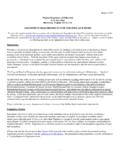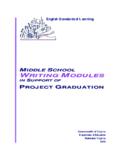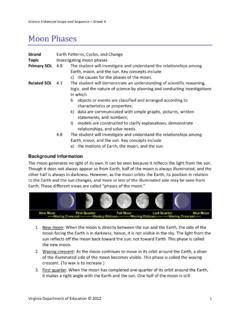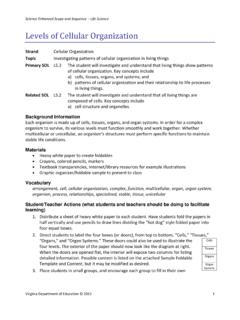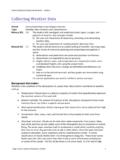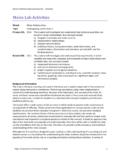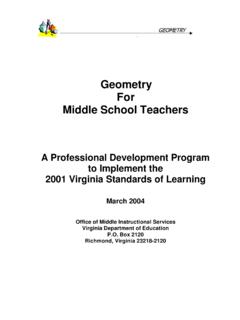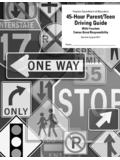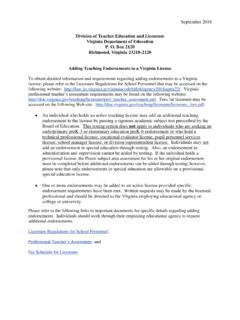Transcription of Lesson Skill: Narrative writing vs. explanatory writing
1 English Enhanced Scope and Sequence 1 Lesson Skill: Narrative writing vs. explanatory writing Strand writing SOL Materials writing Purpose Sorting Cards (attached) Lesson 1. Discuss different purposes an author has for writing . Sometimes an author writes to explain or give information about a topic. Other times an author writes to tell a true story in the form of a Narrative . 2. Provide each student with a copy of the attached writing Purpose Sorting Cards. Have them cut the cards apart and divide them into two categories: those writing topics that should give information and those that should tell a Narrative true story. Allow students time to work independently or with a partner to sort the cards.
2 After several minutes, discuss the correct answers together. 3. Tell students that when an author writes a piece to inform or explain, it is organized differently from a piece written to tell a story. Select a topic students have been learning about in a content area, and locate a fiction book about this topic. Read the book aloud to the class. Next, read a nonfiction book or content area textbook article about the same topic. 4. As a group, analyze the two pieces to determine organizational characteristics for each writing genre. For example, informational/ explanatory writing has a clear introduction, has information grouped into related paragraphs, includes facts, and has a conclusion.
3 On the other hand, Narrative writing follows a logical sequence to organize events, includes transition words, and has a conclusion to wrap up the story. 5. Select a content-area topic about which students have been learning. Have them use the writing process to develop an informational piece about this topic, using facts and details they have learned. As a follow-up, have them write a Narrative story about the topic. Strategies for Differentiation Have students complete the writing Purpose Sorting activity with an interactive white board or document camera. Use a Venn diagram to compare and contrast explanatory and Narrative writing .
4 Teach Narrative and informative writing separately before comparing and contrasting. Display an example of a Narrative writing , using available technology. Display an example of an informative writing , using available technology. English Enhanced Scope and Sequence 2 writing Purpose Sorting Cards Tell the difference between frogs and toads. Tell about the time you got your favorite birthday gift. Write about what happened on your first day of school. Pretend you can fly, and tell a story about what happens. Describe the different parts of a plant. Imagine you are a bug for a day, and tell about your adventures. Explain the steps you must follow to multiply 98 36.
5 Tell about a funny time you had with a friend. Explain how to care for your favorite animal. Write about your favorite memory last school year. Explain the rules you should follow to play football. List reasons that electricity is important.
